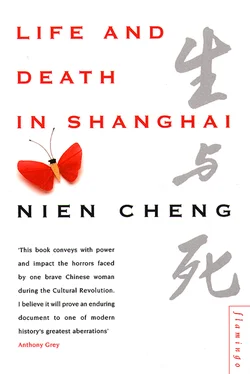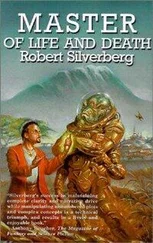Because we lived in a permanent state of shortages, every household with enough living space had a store cupboard in which we hoarded such daily necessities as flour, sugar and tins of meat as reserve supplies. Each time I went to Hong Kong I also brought back cases of food and soap to supplement our meagre ration even though the rate of import duty was astronomical. The Red Guards had emptied my store cupboard. Flour, sugar and food from tins they had opened lay on top of heaps of clothing they had taken out of cupboards, trunks and drawers. Some suitcases remained undisturbed, but I could see that they had already dealt with my fur coats and evening dresses with a pair of scissors. The ceiling fan was whirling. Bits of fur, silk and torn sheets of tissue paper were flying around.
Every piece of furniture was pulled out of its place. Tables and chairs were overturned, some placed on top of others to form a ladder. As it was summer, my carpets had been cleaned, sprinkled with camphor powder, rolled up and stored in an empty bedroom on the third floor. Behind the largest roll of carpet, I found a shopping bag in which were stuffed two of my cashmere cardigans and several sets of new underwear. It seemed a thoughtful Red Guard had quietly put them away for personal use.
In the largest guest room where the Red Guards had carried out most of their destructive labour of cutting and smashing, a radio set was left on a local station from which revolutionary songs based on Mao’s quotations were being broadcast. A female voice was singing ‘Marxism can be summed up in one sentence: Revolution is justifiable.’ There was a note of urgency in her voice that compelled the listeners’ attention. This song was to become the clarion call to battle not only for the Red Guards but also for the Proletarian Revolutionaries when they were organized later on. I thought of switching off the radio but it was out of my reach unless I climbed over the mountain of debris in the middle of the room.
I looked at what had happened to my things hopelessly but indifferently. They belonged to a period of my life that had abruptly ended when the Red Guards entered my house. Though I could not see into the future, I refused to look back. I supposed the Red Guards had enjoyed themselves. Is it not true that we all possess some destructive tendencies in our nature? The veneer of civilization is very thin. Underneath lurks the animal that is in each of us. If I were young and had belonged to a working-class background; if I had been brought up to worship Mao and taught to believe him infallible, would I not have behaved exactly as the Red Guards had done?
The struggle over the porcelain had exhausted me. My chest throbbed with pain. I wondered whether a rib had been broken. Examining my chest in the mirror of the bathroom, I saw a large bruise on the right side. I went down to the second floor looking for somewhere to lie down and rest. I opened the door of my own bedroom. It was in the same state of disorder as the third floor. Through the open door of my study, I saw my jewellery laid out on the desk. Since the Red Guards were still in the dining room discussing what they were going to do with the porcelain, I quickly withdrew to avoid suspicion that I was attempting to recover anything. I turned the handle of my daughter’s bedroom door to find the room as yet undisturbed. The strong breeze from the open window was tossing the gauze curtain. Crossing the room to secure it to the loop, I chanced to look down and was attracted by the sight of bright leaping flames in the garden. I saw that a bonfire had been lit in the middle of the lawn. The Red Guards were standing around the fire carelessly tossing my books on to the flames. My heart tightened with pain. I turned my back to the window and closed my eyes, leaning against the windowsill for support. Hoping to shut out what I had seen and heard during the last few hours, I tried to escape to my inner self for a moment of peace and prayer.
Suddenly, a girl Red Guard appeared in the doorway and switched on the light. “What are you doing here? Who told you to come here? Are you up to some tricks?’ She bombarded me with questions but did not wait for me to answer her before she said, ‘Come along! We need you.’
I followed her to my study. Several Red Guards were gathered around my desk. Seated on the chair was a thin girl with bobbed hair in a faded blue cotton blouse that she had outgrown. In a society where food was at a premium, those who had to depend entirely on official rations, without recourse to perks or the black market, generally acquired a pinched look. She was just such a girl. I supposed she came from a working-class family living on a tight budget, without either of her parents being smart enough to become a Party member. She sat there tensely with head bowed and I guessed that the others, who fell silent when I entered the room, had been questioning her. One of the male teachers was standing next to the girl. He said to me, ‘Pull up a chair and be seated.’
Several Red Guards brought chairs from my bedroom next door and both the teacher and I sat down. I was directly opposite the girl on the other side of my desk. As I took my seat, she looked up and hastily threw me a nervous glance that was half-frightened and half-appealing. On the desk in front of me was my jewellery case and some of the jewellery was on the blotting pad on the desk.
‘Is this all the jewellery you have? Look them over and tell us if everything is here,’ the teacher said.
Opening the case, I saw that several rings, bracelets and a diamond watch were missing. The teacher asked again, ‘Is it all here, your jewellery? Speak the truth. We are going to check with your servants too. Have you hidden some? Some of the capitalist families have tried to hide their jewellery among flowers in the garden.’
It was a tense moment. The boys at the other end of the room removing records from the record cabinet stopped to wait for my answer too. I understood the situation fully. They all suspected the girl, who had probably been left alone for a short moment, of having secreted some pieces of jewellery. In fact, that was probably exactly what she had done. If I lied to protect the girl and if my servants, who knew what jewellery I had, did not, I would be laying myself open to charges that I had hidden my jewellery. There was no choice for me but to tell the truth. Yet, the girl looked so pitiful that I hated having to incriminate her.
‘The main pieces are here. The most valuable ones such as this jade necklace and this diamond brooch are here. A few pieces are missing but they are not the most valuable.’ I tried to minimize the girl’s predicament.
‘What is missing?’ the teacher asked impatiently.
‘A watch, several rings and gold bracelets.’
‘What is the watch like? What make is it? Is it like this one?’ The teacher stretched out his wrist and I saw that he had on an imported Swiss watch, a status symbol in Communist China. He thought I had a man’s watch like most other Chinese women who tried to achieve equality by being the same as men. But I had never followed the new fashion.
‘No, the missing watch is a small one with diamonds and a platinum strap. It’s French. The name of the maker is Ebel.’
‘I hope you are not lying. How come you had such an unusual watch? Swiss watches are the best, aren’t they?’ While the teacher was speaking to me, he gestured to a Red Guard to go to the drawing room downstairs to see if such a watch was among the cameras and binoculars. The Red Guard soon came back and shook his head.
‘The Ebel watch was bought in Hong Kong when my late husband and I were there in 1957. It was his last gift to me. Please ask Chen Mah. She knows all about it and is familiar with all my things, including my jewellery.’
Читать дальше












